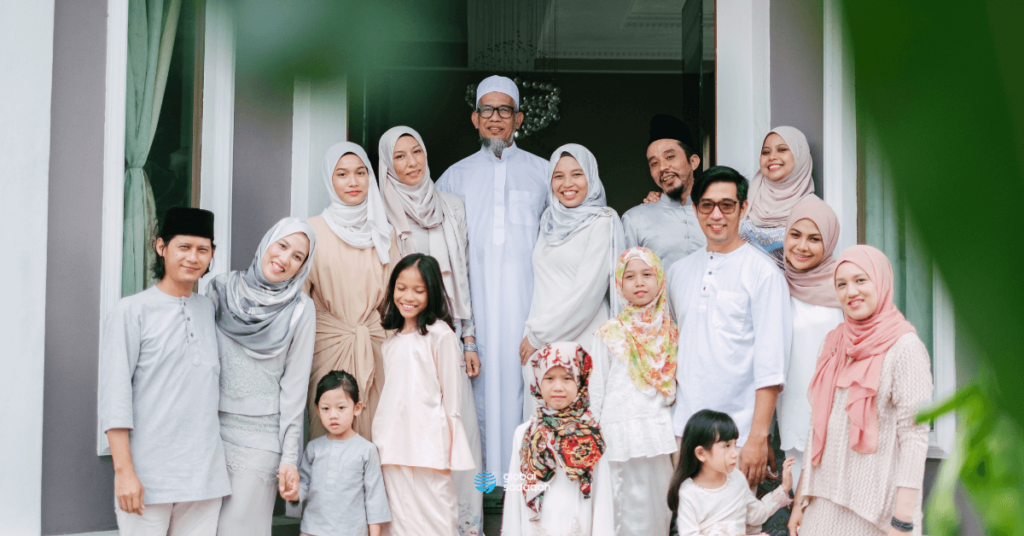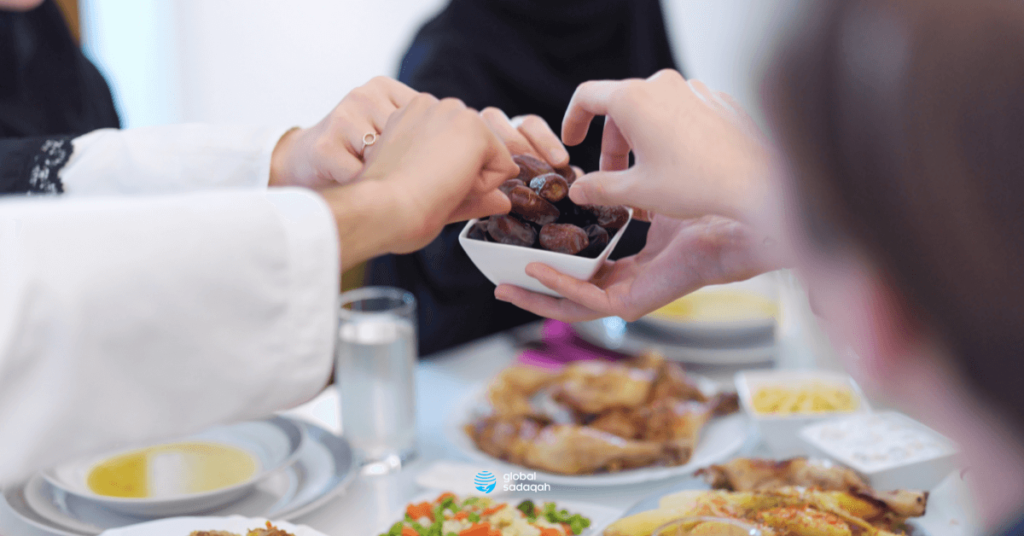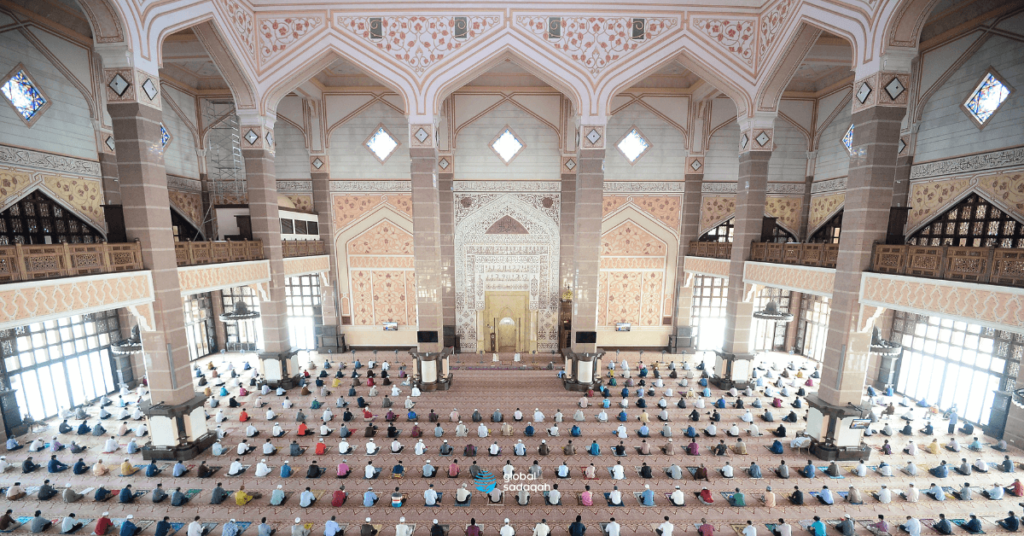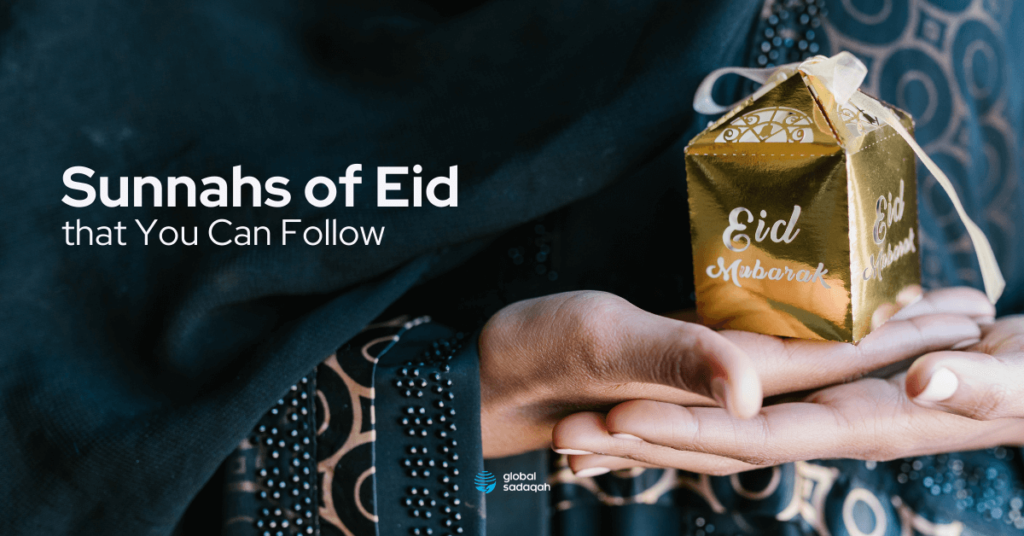Eid is a joyous occasion for Muslims. It’s a celebration of victory as we triumph over our worldly desires throughout the fasting month of Ramadan in order to seek the pleasure of Allah. It’s the most significant season for Muslims around the globe, with families getting together and visiting one another. Here are sunnahs of Eid that we can follow as we usher in Shawwal with our loved ones.
1) Make du’a on the night of Eid
Imam Ibn Rajab recorded that Ibn Abbas said,”’When the day of Eid al-Fitr (begins), the angels descend on earth, where they take their positions at access points of roads, calling out with a voice that is heard by the whole creation of Allah, except men and Jin, “O Ummah of Muhammad ﷺ! Come out to your most Noble and Gracious Lord, who grants much, and pardons the major sins”.
When they (the Ummah) proceed to their places of prayer, Allah, Exalted is He, says to His angels, “O My angels! What is the reward of a worker when he has done his work?”
So they (the angels) say, “Our Lord and Our Master! To receive his reward (for the work, in full)“.
So Allah says, “I call you to witness that, for their fasts (during Ramadan), and for their standing in prayer at night, I have made their reward My Pleasure, and my Forgiveness. Depart (from here), you are forgiven”’. [Lataif al-Ma’arif]
So spend some time during the night of Eid to make a lot of du’as. May Allah answer all of your prayers and forgive our sins.
2) Recite takbir
Part of the sunnah of Eid is to enliven the night of Eid with takbir recitation. It shall begin from Maghrib right until Eid prayer begins. When we recite takbir, we proclaim the greatness of Allah while expressing our gratitude to Him after blessing us with the holy month of Ramadan.
Here’s an excerpt and the meaning of the takbir that we can recite beginning on the night of Eid.
اللهُ أَكْبَرُ، اللهُ أَكْبَرُ، اللهُ أَكْبَرُ
Allah is the Greatest
لاَ إِلَهَ إِلاَّ اللهُ وَاللهُ أَكْبَرُ، اللهُ أَكْبَرُ وَللهِ الْحَمْدُ
There is no deity worthy of worship but Allah and He is the Greatest
Allah is the Greatest and to Him belongs all praises
3) Sunnah to take a bath (ghusl) on the morning of Eid
While taking a bath in the morning is something we do regularly on a day-to-day basis, doing it on the morning of Eid carries a special reward as it follows the sunnah of the Prophet.
“The Prophet ﷺ used to have a bath on the day of Fitr and the day of Adha.” [Ibn Majah]
So before you take a bath, make an intention that you are doing it to follow the sunnah of the Prophet ﷺ. May you be rewarded by Allah.
4) Wear your best outfit

Apparently, buying new clothes for Eid is not just a cultural thing. It’s aligned with the sunnah of Prophet ﷺ that encourages us to wear our best outfit for Eid.
However, you don’t necessarily need to get a new one. The sunnah is to wear the best piece of clothing that you have, no matter whether it’s old or new. Most importantly, the clothes that we wear cover our aurah properly.
Related: How do Muslims around the World Celebrate Eid
5) Put on your best perfume
Smell good and feel good on Eid. It is sunnah to use the best perfume you have for Eid. The beauty behind it is that it slims down the chances of making other people feel uncomfortable around us should our body emits a non-pleasant odour. Being considerate of others is one of the beautiful traits that we should nurture as Muslims.
As reported by al-Hakim, Anas bin Malik said, “The Prophet ﷺ ordered us to wear a good dress for Eid, to use the best perfume we have, and to give charity with what we have as the most valuable.”
If you are looking for a trusted platform to give charity to this Eid, check out GlobalSadaqah. We host an array of verified charity campaigns from around the world by our partners.
6) Sunnah to eat before Eid prayer

It is forbidden to fast on the morning of Eid. Abu ‘Ubaid said, “I was present at Eid with ‘Umar, and he started with the prayer before the khutbah. He said: The Prophet ﷺ forbade fasting on these two days: The day of al-Fitr is the day when you break your fast, and on the day of al-Adha. [Ahmad]
On the other hand, the Prophet ﷺ would eat some dates before he went to Eid prayer.
Narrated Anas bin Malik, the Prophet ﷺ never proceeded (for the prayer) on the day of Eid al-Fitr unless he had eaten some dates. Anas also narrated: The Prophet ﷺ used to eat odd number of dates. [Bukhari]
7) Sunnah to perform Eid prayer

The sunnah Eid prayer is a highly recommended (sunnah muakkadah) prayer in Islam. According to scholars, it is considered as one of the most highly regarded amongst other sunnah prayers (nawafil). The Prophet ﷺ never missed performing this two-rakaat prayer during his lifetime.
Related: 5 Tips to Achieve Istiqamah
Unlike the obligatory prayers, Eid prayer begins without adhan or iqamat and ends with a sermon (khutbah).
Jabir narrated, “The Prophet ﷺ led us in praying on Eid before the khutbah, with no adhan and no iqamah.” [Nasa’i]
In another hadith, Ibn ‘Umar said, “The Prophet ﷺ, then Abu Bakr, then Umar, used to pray the Eid prayer before delivering the sermon.” [Ibn Majah]
8) Use different routes
If you are going to the mosque for Eid prayer, it’s sunnah to take different routes to and fro.
Abu Hurairah narrated, “When the Prophet ﷺ would go out on the day of Eid by one route, he would return by another.” [Tirmidhi]
9) Congratulating and wishing one another
It is also part of the sunnah to wish and congratulate our family and friends as we celebrate the day of victory. We can use greetings like ‘Eid Mubarak’, and other local wishes unique to your culture.
It’s also good to take the example of the companions of the Prophet ﷺ in greeting one another. Jubayr ibn Nufayr narrated that when the companions of the Prophet ﷺ met one another on the day of Eid, they would say to one another, “Taqabbal Allahu minna wa minkum”, which means “May Allah accept (the fast and worship) from us and from you.”
Eid Mubarak to all Muslims worldwide! May Allah accept our deeds and bless our celebration.
Related: Fasting 6 Days In Shawwal | 5 Things You Need To Know

